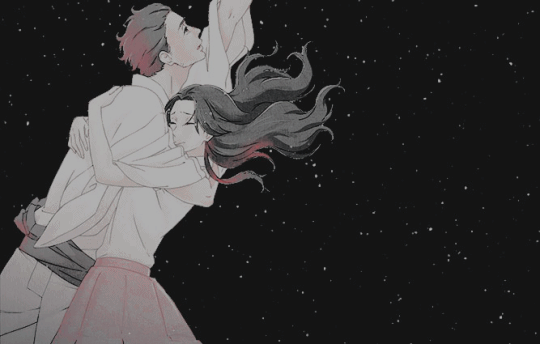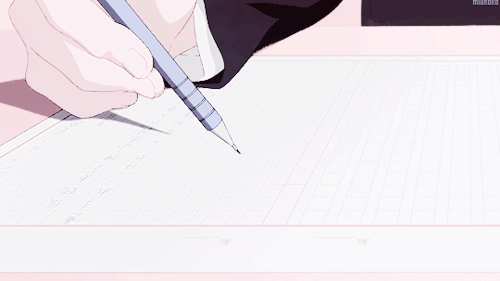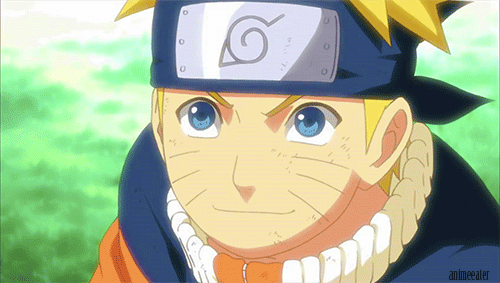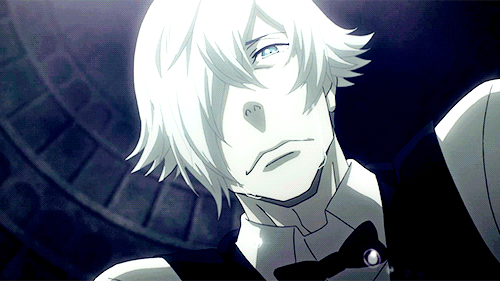lesson 6 || the art of progression : the soul
This lesson is dedicated to TDOROKI who requested this lesson.
Hey, guys! This was a difficult lesson to conjure, especially of its importance. After this lesson, I'll be doing story development in the next chapter.
Thanks for requesting, Chloe!
Now, shall we begin?
Lesson 6 || The Art of Progression : The Soul

If there is anything that I look forward to in a story: it's character development. It's the heart of a good story aside from the storyline itself. Because often times when there's a good storyline, but not good character development, then the story is ruined in the most unfortunate manner. The purpose of a story, of course, is that we see characters see things through in whatever circumstance that may have come their way--leading to the message the writer has for us. We learn about the character as the story progresses, we see them grow because of the choices they make.
Any story without the character progressing through the story isn't exactly a good story. There are some stories I've read that wholly focuses on comedic entertainment (I read some webtoons that have these) through the everyday life of the character(s) they surround. But putting that aside, stories are supposed to have character development.
For some of you who may be wondering what character development is, it's the gradual growth of a character's personality, belief, and strengths. There are two types of character development: good growth and evil growth.
What I mean by good growth and bad growth is that good growth is where the character becomes a better person. That's basically what happens. The most cliche would be like a cowardly character becoming a brave hero. I could give some examples because people have different circumstances:
1) The already-good hero
2) The neutral to good
3) The villain-turned-hero
I'll talk about them one by one, but I'll explain bad growth first. Bad growth is the regression of a character. This could include good characters turning into villains, etcetera. Like their morals get stained all that.
4) The hero-turned-villain
5) The neutral to evil
6) The bad-to-worse villain

Types of Characters in Character Development
1) The already-good hero
When we deal with this kind of character, they are often the ones who smile all the time, already has instilled good morals within themselves, etc. So what happens in the story is that we see them grow better through the various trials they face. They become from good to better--often the growth we see is often the strengthening of their already existing morals and the improvement of their skills.
Like how we see Naruto. He was a lonely orphan, and though he didn't have a good childhood, he still faced those head-on and wanted to prove to EVERYONE that he is good and is a hero with a dream to become the Hokage. Naruto showed us that he could persevere even if no one believed him. The same goes for Asta and Midoriya. From zero to hero, but they are already good and heroic inside.
We see these characters grow because of certain motivations like becoming the top from ground zero. We see them persevere even if it's super hard. They aren't perfect, they could waver, but they never give in. When we read about them, we get hyped. Because we see that they are doing whatever they can t become better.
2)The neutral to good
This types of characters are the ones who often look at themselves as the neutral ones in society--saying that they have no connection to the big things. Simply believing that they belong to the sidelines to be part of the story as observers. This one we watch if they become hero or villain.
But, of course, we the writers make them change. These type of hero would be hurled into a dilemma and be forced to realize that hey cannot be neutral--they have to pick a side. There are three considerations under this category: the coward, the rebel, and the true neutral (neither coward, rebel, hero, or villain).
For coward and rebel, we see that they learn to fight for what they believe in after learning that there are consequences to doing nothing. For example, a cowardly character will learn to stand up for himself. From that nobody who just finds himself hiding in the dirt, to someone who rescues people even if he feels scared.
To be honest, rebellious characters are the least type I like LOL. I'm serious, AHAHA. This one, of course, is the one who goes telling people to fuck themselves because they don't care or they don't follow anyone's rules because they are their own person. I'll go straight to the point because I despise this type, AHAHAHA. We see this character realize that they have to learn to care, that humanity isn't made of islands, but rather communities where people learn to live with each other. I noticed that when the rebel is used, they grow through the series of mistakes they make because of their foolishness. We cringe and bite our fingers as we watch them realize their mistakes.
Then finally, there's the true neutral: the observers. Those who are in the sidelines, those who follow orders, those who belong in neither side of right and wrong. These characters are there with no true sense of morality and such.
Actually, if there was any character out there that I consider having a neutral to good character development, it would be Violet Evergarden from Violet Evergarden. The reason why I placed her in this category is that she was neither a hero or a villain. She simply followed orders--though blindly. She was a killing machine with no regard for life because she had only one goal: serve Gilbert Bougenvillea.
We witness her transition and we learn to love and empathize with her. She learns and grows her morals. She was no hero until the day she started changing people's lives for the better. And we truly witness her growth when she learned to cry and empathize, later promising a better future. She learned to love and care, and she knew the meaning of it.
3) The villain-turned-hero
When we encounter villain-turned-heroes--so we got the basic info that this person was a bad guy, then somehow, they are miraculously changed for the better. However, for starters, we learn about their past, what made them give in to the darkness, what they realized when they decided to go bad.
But for the transition, this is how this works, we start with making them question their morals and then giving them the light that they have been doing the wrong type of work. Often we see these characters not as the main, but as the side characters who help the valiant hero at the climax of their story where they often switch sides. I'm sure you guys have seen that certain characters betray and switch sides.
4) The hero-turned-villain
This type is when the hero loses faith in what he believes in. Some sort of tragedy struck the hero, thus his change of morals and philosophy. Honestly, this is where the story gets sad because it often happens to the readers' favorite hero in the story.
5) The neutral to evil
This one is the same as the neutral to good, only that they took the course to evil.
6) The bad-to-worse villain
This one is the very epitome of Light Yagami. From the very start, he was a villain who was self-righteous and thought himself god. He could've used the Death Note for good, but instead, he abuses it and starts killing people in the way. As a writer, we write about the degradation of this character. We see him harm himself until he becomes his worst or let his decisions lead him to his ultimate destruction: death.
It's also how Johann from Monster was. Though he was already the villain, the writers slowly sink us viewers into the darker and murkier side of the character. Being one of the same characters and the villain, we see how his childhood corrupted him and how that leads him to making terrible and monstrous decisions despite the fact of how smart he actually is. He is deemed as one of the smartest characters in the anime universe, but also one of the worst anime villains.
So characters like this are already deemed evil but they get worse when the hero tries to sway them from their dark philosophies. But instead of turning back from the dark path, they retaliate and become worse than they originally were.
7) bonus type
There are special cases of development, and an example would be Sasuke. Or basically his character type: hero-villain-hero. In this case, he was first introduced as a hero with a dream to become Hokage, but he turns into a villain because of his lust for power, but again he returns into becoming a hero when he realizes his mistakes thus looked for redemption. There are many characters who go through this type of development.

Creating the MEANS of Development: The Steps to Character Development
What I love or would love to see in character development is seeing the character question their morality--their perception of right and wrong. I'm experimenting with this type of character in Faust Lied to the Devil, a Boku no Hero Academia fanfic I'm currently writing. I have a lot of plans in mind for Shinju because she's emotionless and works as a hero--a lot of things could happen when an emotionless character and emotional work are combined together. Many things could happen, she could either learn the true ways of a hero--becoming someone valiant like All Might or turn into a villain with twisted ordeals like One-for-All.
The key to good character development is that we allow the character's growth through the series of situations we place them in (as writers). As to what could help them develop, it could simply start with small situations that reveal more of who they really are (in my opinion, the writer knows the character inside and out after all--the readers are the ones who are getting to know the character). Then there come the scenarios that force them to make something radically dangerous which leads on to what could come to the next phase of the story.
What comes next after those situations is the sign of the character's growth: how they react and how they respond. Basically, how they react and take things in, we get to know the character more and more and we see their inner psyche. We see if the character learns or if they don't so they need to be faced with a harder situation.
A good story development is not rushed. It is kept at a normal rate. I'm honestly not sure how I could properly describe how to do this, but it should go in this sequence at the very least:
1) Introduction of character(s)
2) Introduction of mission/quest/goal
3) The journey/growth
4) Faces of trouble
5) Mission/quest/goal completed by the character(s)
Thus whether the story should be among these themes:
1) Man vs man
2) Man vs himself
3) Man vs society
4) Man vs nature
5) Man vs technology
How you make the story is up to you. You are completely free to mess with the sequence; you are the writer after all. Let only your imagination be the limitation; nothing else.

Another thing: their flaws are one of the aspects that could hinder the character's growth. Flaw and perk are different, mind you guys. Perk is just something used to define a character, make them unique. It has doesn't make a big impact on the story, but a flaw does. A flaw is what might prevent the character from making a good decision. Take an emotionless character, being emotionless in itself is a flaw because it carries the character in their decision-making and how people perceive them.
Supporting characters are also very important. They help the protagonist move forward and often serve as guidance or tool as a means to move on with the story. Supporting character don't necessarily need backgrounds unless it is necessary for the story to move on. I avoid adding backgrounds to characters who don't have much relevance, though backstories could simply be simplified into a few facts about the characters and not their everything.
The character's history is also what could help him move forward or stunt him. It doesn't always have to be a tragedy, some abuse could already do the trick. As human beings, we know that even the slightest neglect or rejection could spike up certain despise for someone or even more. An imperfect character is what we need--they could be so perfect, but a single flaw is targeted to make them suffer and ultimately grow into someone better (or worse).
Another one could be the stakes of their mission, goal, or quest. Realizing danger and knowing fear are available tools to help create the character and finishing who the character is in the end. One author (I forgot his name) said that what defines the character ultimately is the villain. Because the villain is the one who makes the character struggle and suffer. Who he is and how he makes the protagonist's life complicated is one of the best ways to help the character develop as he makes a vow to stop/kill the villain.

At a final note, guys, what I want you to remember is that when you have people describe the character, it has to be justified. JUSTIFIED. I wrote that in capitals. As a writer, viewer, reader, all that, I absolutely detest unjustified Mary Sues. Examples of these would be Ray from Star Wars and Alita from Alita Battle Angel.
Ray is a new Jedi in Star Wars and she was a total nobody, just some scavenger. She is later needed of training to become a Jedi, and what I hated was how quick she got the hang of it and she wasn't even trained for as long or as draining as Luke did and the other Jedis before him. She just suddenly manages to become one with the force in such a short time, you'll get triggered if you were a Star Wars fan. Exactly how I felt.
This is an example of a character's unjustified skill growth. She even killed the master siths in the second movie of her trilogy, like what the fuck. She came unscathed and even is on par with Kylo Ren who trained longer (years!!!) and harder than she ever did. So why the fuck did she beat him??
For Alita, she was a very much praised character in the movie. She was called "kind" and "most human". But if you watch the movie, you don't see ANY justification of that. Those descriptions were bullshit, because all she ever did was not follow the rules of her adoptive father--"I don't follow anyone's rules," she quoted; and she even beat up people in a bar because they wouldn't listen to her plea of help. So the fuck, why is she kind and human? By far, she only proved herself rebellious and violent.
SO yeah, note the justifications needed in the character's growth. You can't just do whatever you want with the character because of the story, plus they are your precious baby. You have to justify why the character is described something, or else it's going to turn off people--like me, LOL.
♦ ♦ ♦ ♦ ♦ ♦
I hope you found this helpful, please comment your thoughts, suggest ideas, and good luck with your writing!!!
//hugs
See you at the next chapter! And don't be scared to request lessons or something.
Upcoming lessons:
> au's, cannons, and in-betweens
> jaw drops: plot twists
> etc.
Bạn đang đọc truyện trên: Truyen247.Pro